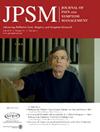Early Supportive and Nutritional Care For Adults With Pancreatic Cancer: A Pilot Study
IF 3.5
2区 医学
Q2 CLINICAL NEUROLOGY
引用次数: 0
Abstract
Context
Individuals diagnosed with advanced pancreatic cancer face a poor prognosis, heightening the importance of interventions aimed at improving quality of life. Quality of life for individuals with pancreatic cancer is highly influenced by symptom burden and nutritional status. Programs are needed that coordinate palliative and nutrition care for this population.
Objectives
To address this gap, we conducted a single-arm feasibility trial of Support Through Remote Observation and Nutrition Guidance Plus Supportive Care (STRONG+), a 12-week team-based digital intervention to reduce malnutrition and improve quality of life for individuals with advanced pancreatic cancer.
Methods
Participants initiating palliative chemotherapy were referred for early and ongoing dietitian-led nutrition counseling and supportive care visits led by a palliative care specialist during the first three months of chemotherapy. Participants also logged food intake daily and completed patient-reported outcome assessments monthly, data that was shared with the dietitian and palliative care specialist through a web-based dashboard. Feasibility and acceptability outcomes were compared against prespecified benchmarks. Preliminary effectiveness was evaluated based on change in patient outcomes between baseline and last follow-up at 16 weeks using linear and ordered logistic regression models. Outcomes included malnutrition risk assessed using the Patient-Generated Subjective Global Assessment Short Form and health-related quality of life measured using the FACT-G. Qualitative data obtained through interviews with participants, their caregivers, and clinicians was analyzed for themes.
Results
Among the 83 eligible patients who were invited to participate in the study, 50 patients consented to participate. A total of 12 individuals withdrew or died prior to study conclusion. Participants who completed the study (N = 38) had a mean age of 65. Feasibility benchmarks were achieved for participant recruitment (60% vs. benchmark: 50%), attrition (24% vs. benchmark: 30%), study assessment completion (84% vs. benchmark: 70%), and adherence to nutritional counseling (68% vs. benchmark: 60%) and supportive care visits (61% vs. benchmark: 60%). Participants found the overall intervention to be highly acceptable (94% vs. benchmark: 70%). Caregivers also rated the intervention as highly satisfactory (87%). Compared to baseline, participants saw decreased malnutrition risk (P < .001) and improved general health-related quality of life (P = .009) at the end of the study (16 weeks). Participants cited benefits of the intervention including increased knowledge about self-managing nutrition and improved symptom management. Participants provided recommendations for intervention refinement, such as providing recipes and more hands-on nutrition instruction.
Conclusion
Study findings suggest the intervention may be feasible and acceptable. Future research is needed to refine the intervention and test the intervention in a fully powered trial. Because the study focused on patients initiating palliative chemotherapy who may benefit from nutrition counseling, findings may be limited in generalizability to all individuals with pancreatic cancer.
成年胰腺癌患者的早期支持和营养护理:一项初步研究。
背景:被诊断为晚期胰腺癌的个体预后不良,提高了旨在改善生活质量的干预措施的重要性。胰腺癌患者的生活质量受到症状负担和营养状况的高度影响。需要为这一人群制定协调姑息治疗和营养护理的方案。为了解决这一差距,我们进行了一项通过远程观察和营养指导加支持性护理(STRONG+)支持的单臂可行性试验,这是一项为期12周的基于团队的数字干预,旨在减少晚期胰腺癌患者的营养不良并改善其生活质量。方法:开始姑息化疗的参与者在化疗的前三个月接受由姑息治疗专家领导的早期和持续的营养咨询和支持性护理访问。参与者还每天记录食物摄入量,并每月完成患者报告的结果评估,这些数据通过基于网络的仪表板与营养师和姑息治疗专家共享。可行性和可接受性结果与预先指定的基准进行比较。使用线性和有序逻辑回归模型,根据基线和16周末次随访期间患者结局的变化评估初步有效性。结果包括使用患者生成的主观总体评估简表评估营养不良风险,使用FACT-G测量与健康相关的生活质量。通过对参与者、其护理人员和临床医生的访谈获得的定性数据进行主题分析。结果:83名符合条件的患者被邀请参加研究,50名患者同意参加。共有12人在研究结束前退出或死亡。完成研究的参与者(N=38)平均年龄为65岁。在参与者招募(60% vs基准:50%)、减员(24% vs基准:30%)、研究评估完成(84% vs基准:70%)、坚持营养咨询(68% vs基准:60%)和支持性护理就诊(61% vs基准:60%)方面达到了可行性基准。参与者发现整体干预是高度可接受的(94%对基准:70%)。护理人员对干预的评价也非常满意(87%)。与基线相比,参与者看到营养不良风险降低(结论:研究结果表明干预可能是可行和可接受的。未来的研究需要完善干预措施,并在全动力试验中测试干预措施。由于该研究关注的是开始姑息性化疗的患者,这些患者可能受益于营养咨询,因此研究结果可能无法推广到所有胰腺癌患者。
本文章由计算机程序翻译,如有差异,请以英文原文为准。
求助全文
约1分钟内获得全文
求助全文
来源期刊
CiteScore
8.90
自引率
6.40%
发文量
821
审稿时长
26 days
期刊介绍:
The Journal of Pain and Symptom Management is an internationally respected, peer-reviewed journal and serves an interdisciplinary audience of professionals by providing a forum for the publication of the latest clinical research and best practices related to the relief of illness burden among patients afflicted with serious or life-threatening illness.

 求助内容:
求助内容: 应助结果提醒方式:
应助结果提醒方式:


